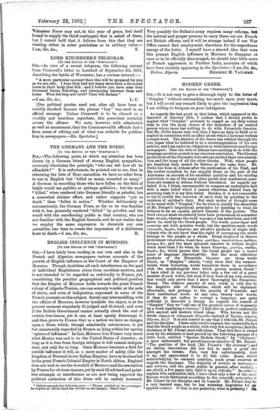ENGLISH INFLUENCE IN MOROCCO.
[TO THE EDITOR OF THE "SPECTATOR:1
SIR,—I have lately been reading in our own and also in the French and Algerian newspapers various accounts of the growth of English influence at the Court of the Emperor of Morocco. Though doubtless all such interference on the part of individual Englishmen arises from excellent motives, and is not intended to be regarded as unfriendly to France, yet, considering the peculiar geographical and political position that the Empire of Morocco holds towards the great French colony of Algeria-Tunisia, one can scarcely wonder at the note of alarm, and even of indignation, expressed in some of the French journals on this subject. Surely any intermeddling with the affairs of Morocco, however laudable the object, is at the present moment singularly ill-judged and ill-timed; and even if the British Government cannot actually check the zeal of certain free-lances, yet it can at least openly discourage it, and thus prove to France that as a nation we have no designs upon a State which, though admittedly autonomous, is yet not unnaturally regarded by France as lying within her special "sphere of influence." In fact, Morocco is to France very much what Mexico was and is to the United States of America ; so long as it is free from foreign intrigue it will remain indepen- dent, and only for so long. Once Morocco becomes a field for outside influence it will, as a mere matter of safety (like the kingdom of Burmah in our Indian Empire), have to be absorbed in the great French Colonial Empire in North Africa. England does not wish to see the downfall of Morocco and its annexation by France for obvious reasons, yet by such ill-advised and point- less attempts at interference as are now being reported the political extinction of this State will be unduly hastened.
• Carlyle appends the following note Phrase omitted in the newspaper. In original an official hand has written on the margin, Omitt this."
Very possibly the Sultan's army requires many reforms, but the natural and proper persons to carry these out are French not British officers, and it will be strange indeed if our War Office cannot find employment elsewhere for the superfluous energy of the latter. I myself have a shrewd idea that were this present English influence in Morocco to disappear at once or to be officially discouraged, we should hear little more of French aggression in Further India, accounts of which have been recently appearing in the Spectator.—I am, Sir, eus.,










































 Previous page
Previous page